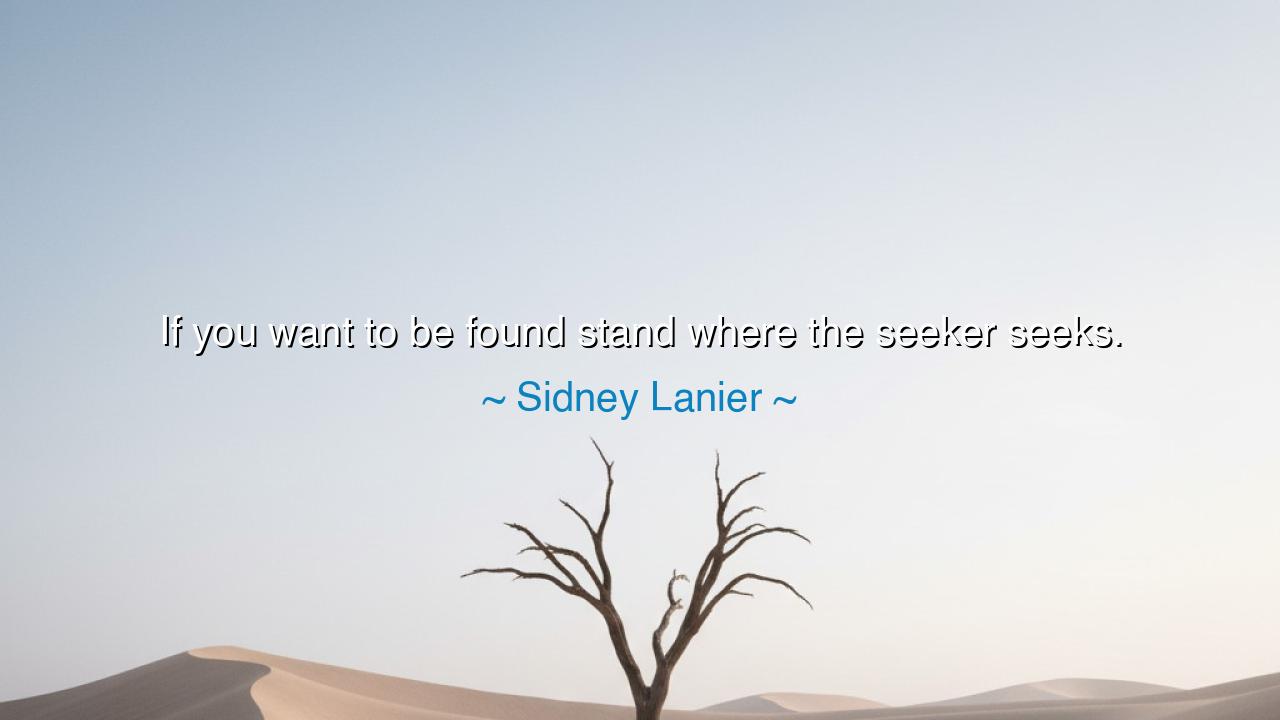
If you want to be found stand where the seeker seeks.






"If you want to be found, stand where the seeker seeks." Thus wrote Sidney Lanier, poet of the South, whose words ring with the clarity of a bell in still air. His counsel is simple yet profound: if you would be seen, heard, or known, place yourself where truth, opportunity, and destiny are searching. To be found is not mere chance—it is the fruit of standing in the right place, at the right hour, where the eyes of the seeker turn.
The ancients knew this wisdom well. The philosopher did not cry his truths in the marketplace alone but gathered where disciples sought knowledge. The warrior did not wait in hidden valleys but stood upon the battlefield where honor was tested. The seeker is always moving, hungry for wisdom, courage, or faith—and he who longs to be found must stand boldly in the place where such hunger is fed.
Consider the life of Christopher Columbus. For years he sought patrons for his voyage westward, yet he was scorned in many courts. But he did not retreat to silence; he placed himself again and again in the halls where kings and queens were seeking new lands, new riches, and new glory. At last Isabella of Spain, moved by the alignment of her desires and his bold vision, became the seeker who found him. His destiny was not random—it was born of standing where the seeker sought.
So too with the prophets of old. John the Baptist did not dwell in palaces but in the wilderness, for he knew that those who sought truth would find him there. And find him they did—scribes, soldiers, peasants, all came to the river seeking repentance. By standing where the seeker sought, his voice became the herald of a greater light.
Therefore, let this wisdom be preserved: if you long for recognition, for purpose, for destiny, do not hide yourself in the shadows of indifference. Place your gifts, your words, your courage in the paths where the seeker walks. For to be found is not a miracle of chance, but the fruit of readiness and position. Stand, then, where the seeker seeks, and your light shall not be hidden.






Nnguyendoanh
This also feels like a focus prescription. Instead of broadcasting everywhere, pick the few arenas where resonance is plausible and measure rigorously. What would a minimalist dashboard track—impressions from the right communities, qualified replies, referral chains, and retention after first contact? I’m curious about cadence: weekly iteration beats, A/B test windows that respect seasonality, and kill criteria to stop vanity placements. Can you propose two experiments—one algorithmic (search/SEO) and one human (events/introductions)—to compare the quality of connections formed?
DVTran Dai Vy
I’m thinking about search behavior and mental models. People rarely articulate what they truly want; they follow heuristics. If I run a service, how do I align with those heuristics without manipulating them? For example, naming conventions that match user vocabulary, metadata that mirrors common queries, or prototypes tested in the contexts where choices occur. Could you outline a lightweight research loop—diary studies, intercept interviews, query log reviews—that keeps my placement honest, useful, and responsive to how attention actually flows?
DTtruong dinh thuan
There’s an ethics and access dimension here. If discoverability depends on specific venues or platforms, doesn’t that hand disproportionate power to gatekeepers and algorithms? What about people who can’t enter those spaces—due to disability, safety, cost, or bandwidth? I’d love a perspective on designing alternative pathways: community-based referrals, offline bulletin ecosystems, multilingual signage, alt text and captions, and open directories. Could you propose a checklist organizations should adopt so that those seeking help don’t have to decode a narrow, exclusionary map?
HNHa Nguyen
Relationally, I’m conflicted. Bridging to someone else’s world can be generous, but it can also slide into self-erasure. How do we calibrate presence without abandoning boundaries—especially for marginalized folks who’ve long carried the load of adapting? I’d like a framework: ask where the other person naturally pays attention, decide what accommodations feel dignified, and name nonnegotiables. Are there rituals for inviting reciprocity so it isn’t always one party translating? And how do we prevent strategic visibility from becoming chronic overextension?
TTTran Thu
Career-wise, this nudges me toward visibility strategy rather than passive hope. For someone job hunting, what are the highest-leverage places to invest: contributor PRs in relevant repos, targeted informational interviews, or micro-portfolios tailored to specific hiring managers? I’d appreciate a one-week sprint plan with daily actions and a simple feedback loop. Also, does optimizing for being noticed risk performative signaling over substance? Where’s the line between thoughtful positioning and hollow personal branding that burns trust once someone looks closer?